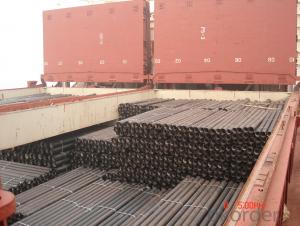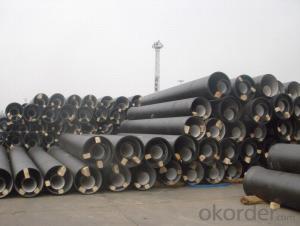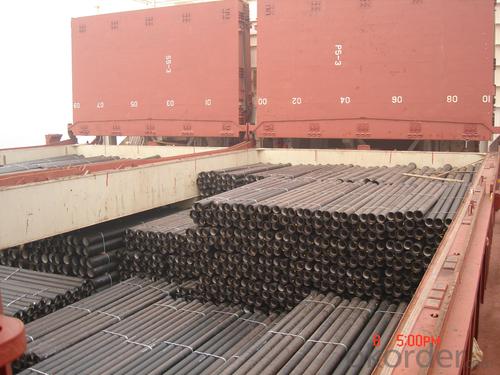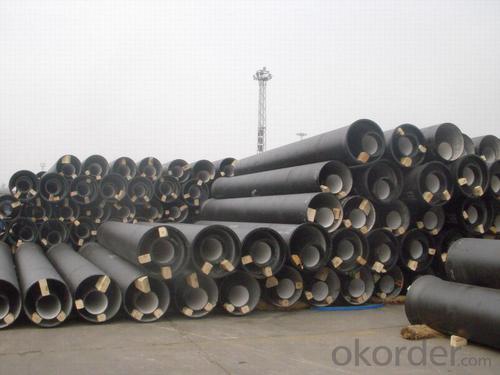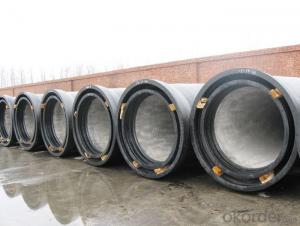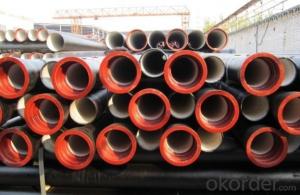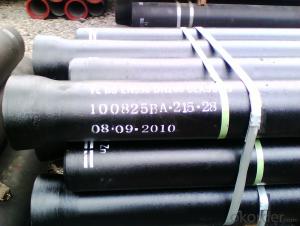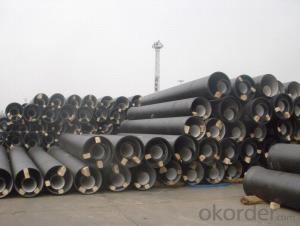Ductile Iron Pipe ISO2531:1998 C CLASS DN100
- Loading Port:
- China main port
- Payment Terms:
- TT or LC
- Min Order Qty:
- 20 m.t.
- Supply Capability:
- 100000 m.t./month
OKorder Service Pledge
OKorder Financial Service
You Might Also Like
1.Ductile Iron Pipe Description :
1) Pipes confirm to ISO2531,K9 class,T type joint,6m long,with inside cements lining conform to ISO4179, outside Zinc
spraying(130g/m2) and bitumen coating(70μm) conform to ISO8179.
2) Pipe ends: Spigot and socket ends, with 100% SBR rubber gaskets accoding to ISO4633
3) we can do third party inspection according to customer's request.
4) Our products have been sold to many international market, such as Middle East and South East Asia and Africa.
2.Main Features of the Ductile Iron Pipe:
1. Material: Ductile iron grade 500-7/ 450-10 in accordance with ISO1083
2. Standard: ISO 2531, EN545, EN598, ANSI, AWWA
3. Certificate: ISO9001, ISO14001, SGS, NSF, WRAS
4. Length: 6m or cut into 5.6m, 5.7m, 5.8m
5. Internal Lining: Cement, conform to ISO4179
6. External coating: Zinc + Bitumen, conform to ISO8179
3.Ductile Iron Pipe Images:
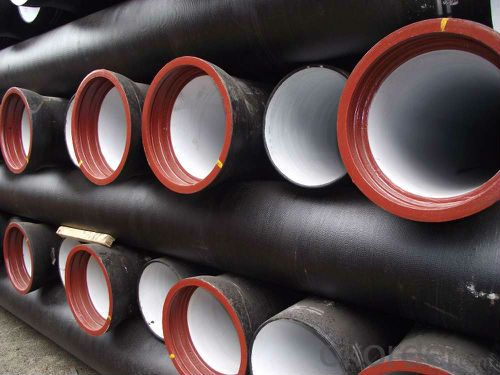
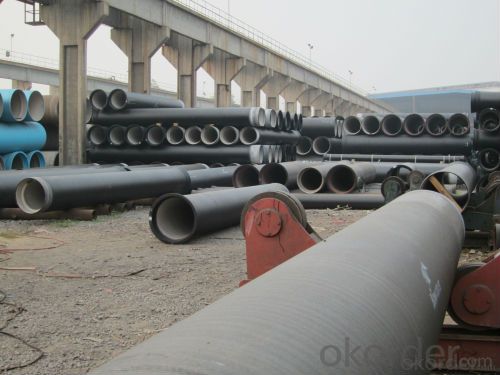
4.Ductile Iron Pipe Specification:
Standard: API SPEC 5L 44th eidtion,ASTM A252-98(2007)
Grade: A53 Grades A/B, ASTM A106 Grades B/C,ASTM A179 Weld Alternatives: LSAW
OD size range: 6.4~44.5mm
Wall thickness: 406.4~1422mm
Length: 3 - 12 m according to requirment
5.FAQ:
We have organized several common questions for our clients,may help you sincerely:
1.Q: Why would you choose ductile iron pipe rather than other pipe materials?
A:The reasons are obvious for that not only ductile iron pipe possesses the inherent strength and flexibility of ductile
iron, combined with proven corrosion protection systems, but also the cost savings can be achieved from design to
installation and commissioning.
2.Q:Why can you guarantee the inner of pipes can’t be corroded?
A: High alumina cement mortar lining and sulphate-resistant cement mortar lining. These two special linings are applicable
to inner anti-corrosion for sewage pipes, improving resistance to erosion of the sewage components.
- Q: Can ductile iron pipes be used for seawater intake systems?
- Seawater intake systems can utilize ductile iron pipes, which are a type of cast iron renowned for their strength, durability, and corrosion resistance. These properties render them suitable for various applications, including seawater intake systems. The high salt content of seawater makes it highly corrosive, posing a threat to regular cast iron pipes that may suffer from corrosion and damage over time. However, ductile iron pipes possess a protective coating acting as a corrosion barrier, enabling them to endure the harsh conditions of seawater. Furthermore, compared to regular cast iron pipes, ductile iron pipes exhibit superior tensile strength, enhancing their resistance to the intense pressures and stresses associated with seawater intake systems. As a result, ductile iron pipes offer a dependable and cost-effective option for seawater intake systems.
- Q: Are ductile iron pipes suitable for power plant cooling systems?
- Yes, ductile iron pipes are suitable for power plant cooling systems. Ductile iron pipes offer several advantages that make them ideal for such applications. Firstly, ductile iron is known for its high strength and durability, making it capable of withstanding the high pressure and heavy loads often associated with power plant cooling systems. Additionally, ductile iron pipes have excellent resistance to corrosion, which is crucial in an environment where water and other cooling fluids are constantly flowing. Furthermore, ductile iron pipes have good thermal conductivity, meaning they can efficiently transfer heat away from the power plant equipment, contributing to the overall cooling process. Lastly, ductile iron pipes are also cost-effective compared to other materials commonly used in power plant cooling systems, making them a practical choice for such applications. Overall, ductile iron pipes are a reliable and suitable option for power plant cooling systems due to their strength, corrosion resistance, thermal conductivity, and cost-effectiveness.
- Q: Can ductile iron pipes be used for drainage systems in airports?
- Ductile iron pipes are an excellent choice for drainage systems in airports. These pipes are well-known for their durability, strength, and ability to resist corrosion, making them suitable for a variety of applications, including drainage systems. They can handle heavy loads, which is crucial in airports where aircraft and vehicles are constantly moving. Moreover, ductile iron pipes are flexible, making installation and modification easy when needed. Additionally, they have a long lifespan, reducing the need for frequent maintenance or replacement. Therefore, ductile iron pipes are a reliable option for airport drainage systems, ensuring efficient water flow and preventing water accumulation to maintain safe and operational facilities.
- Q: What are the recommended bedding and backfill materials for ductile iron pipe?
- The recommended bedding and backfill materials for ductile iron pipe include a combination of granular materials such as sand, gravel, or crushed stone. These materials provide support and stability to the pipe, ensuring proper alignment and preventing damage during installation and operation. For bedding, a layer of sand is typically used to create a uniform and level surface for the pipe to rest on. This helps distribute the load evenly along the pipe's length and reduces the potential for stress concentration. Backfill material is used to fill the remaining space around the pipe once it is properly bedded. It is crucial to select a material that offers good compaction and drainage properties to prevent settling and potential damage to the pipe. Commonly used backfill materials include crushed stone or gravel, which provide stability and allow for proper compaction. It is important to follow the recommendations of the pipe manufacturer and any relevant industry standards when selecting bedding and backfill materials for ductile iron pipe. These materials should meet the specified size and quality requirements to ensure the long-term performance and durability of the pipe system. Additionally, local regulations and soil conditions should also be taken into consideration when determining the appropriate bedding and backfill materials for ductile iron pipe installations.
- Q: What is the ductile cast iron pipe
- Should not have this conceptI make the ductile iron pipe, haven't heard of this thing only ductile iron pipe, ductile cast iron heard tube
- Q: Luo what effect of ductile cast iron
- Chromium is an anti graphitization element, which hinders the graphitization process of cast iron, increases the content of cementite (Fe3C) in the internal structure of cast iron, and stabilizes pearlite at the same time. It affects the mechanical and processing properties of nodular cast iron.
- Q: Can cast iron pipes not be used for domestic water supply and drainage?
- Yes, the main use is, outdoor water supply pipe can be PE or ductile iron (socket connection). Indoor water is now used in general plastic pipes, but in the past seems to be able to use ductile iron, as for drainage, generally do pressure type drainage, when the choice is cast iron pipe. There are also indoor fire pipes using welded steel tubes or ductile iron.
- Q: How many meters does the cast iron water supply pipe dn150,1 tons?
- Reciprocating centrifuge hydraulic device, the pressure was 9.65 x 105Pa. the speed through the overflow valve, cable and cooling water hose is generally fixed on the centrifuge and the machine next to the post, the other end is connected to the shell, random moving together. The production standard of centrifuges is usually fixed. If we want to produce several specifications of pipes on a centrifuge, we need to replace the fan-shaped packages, the hot metal flow plants and the support roller racks.
- Q: Are ductile iron pipes suitable for wastewater pumping stations?
- Yes, ductile iron pipes are suitable for wastewater pumping stations. Ductile iron has high tensile strength, durability, and corrosion resistance, making it ideal for handling the abrasive and corrosive nature of wastewater. Additionally, ductile iron pipes have excellent pressure-bearing capabilities, ensuring reliable and efficient operation in wastewater pumping stations.
- Q: Can ductile iron pipe be used for stormwater management systems?
- Yes, ductile iron pipe can be used for stormwater management systems. Ductile iron pipe is known for its strength, durability, and ability to withstand external loads and harsh environmental conditions, making it suitable for carrying stormwater and managing drainage systems effectively.
Send your message to us
Ductile Iron Pipe ISO2531:1998 C CLASS DN100
- Loading Port:
- China main port
- Payment Terms:
- TT or LC
- Min Order Qty:
- 20 m.t.
- Supply Capability:
- 100000 m.t./month
OKorder Service Pledge
OKorder Financial Service
Similar products
Hot products
Hot Searches
Related keywords
